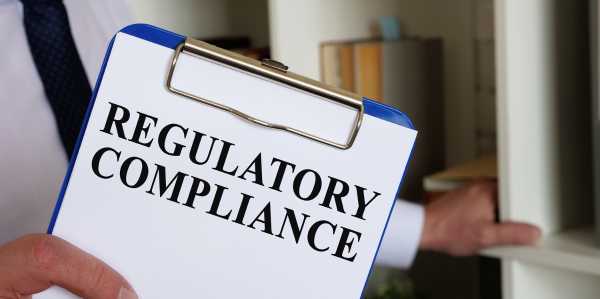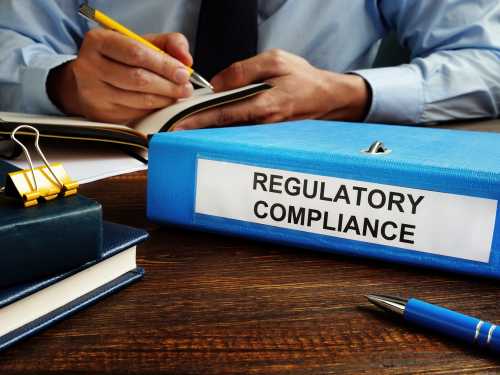What is Regulatory Compliance? 5 Best Practices Every Organization Should Follow

If you run a business, you need to understand regulatory compliance.
This means following all laws and regulations that apply to your business, whether at the federal, state, or industry level.
Think well-known regulatory compliance laws like Payment Card Industry Data Security Standards (PCI DSS) and Health Insurance Portability and Accountability Act (HIPAA).
In essence, regulatory compliance is about ensuring that your business operates in a lawful and ethical manner.
But actually, identifying, creating, and implementing a regulatory compliance policy can be a lot to handle on your own, especially if you don’t even know where to start.
That’s why we’ve put together this article to help you understand what regulatory compliance is all about and five best practices you can implement today to help your organization thrive.
What is Regulatory Compliance?
Regulatory compliance means adhering to laws and regulations that govern your industry. This includes everything from environmental protection laws to labor regulations.
Compliance regulation helps protect both businesses and consumers and by following these rules, companies of all kinds can ensure they operate legally and ethically while protecting their reputation.
Benefits of Having a Regulatory Compliance Policy in Place
Much like following traffic laws helps drivers avoid accidents and tickets, adhering to regulatory compliance ensures that businesses operate within legal boundaries and uphold ethical practices.
Here are some advantages that having a regulatory compliance plan brings:
Increased trust and reputation — By demonstrating a commitment to compliance with regulations, businesses earn the trust of customers who value ethical practices.
Streamlined operations and efficiency — Implementing regulatory compliance standards enables businesses to streamline operations and improve efficiency.
Adaptability to changing regulations — Compliance with regulations helps organizations stay resilient to changing regulatory landscapes. As regulations vary based on the industry, adhering to specific regulatory compliance requirements becomes crucial.
Competitive advantage — Maintaining regulatory compliance offers businesses a competitive edge. Compliance programs and practices can help organizations achieve regulatory compliance more effectively, positioning them as leaders in their respective fields.
Protection of stakeholders — Compliance with applicable laws and regulations, such as those set by the Occupational Safety and Health Administration (OSHA) or the federal regulatory agency for securities, the Securities and Exchange Commission, ensures the well-being of employees, customers, and the broader community.
Legal and financial security — Adhering to regulatory compliance protects businesses from legal and financial repercussions. Implementing compliance best practices ensures that organizations operate within the confines of the law, minimizing the risk of legal disputes and financial losses.
When you follow compliance regulations and implement effective compliance programs, businesses can achieve long-term success and maintain a competitive edge in their industry.
Consequences of Non-Compliance or Lapses in Regulatory Compliance
Ignoring regulations or delaying compliance can lead to serious consequences. You could face fines, jail time, and financial losses due to litigation costs and compensation payouts from lawsuits from customers or employees who have suffered harm due to the lack of compliance.
Non-compliance could also damage your company’s reputation, losing customer trust and ultimately impacting its bottom line. As the saying goes, the best cure is prevention, but if you find yourself in the hot seat, you may consider hiring a regulatory defense attorney.

5 Best Practices to Ensure Regulatory Compliance in Your Company
Regulatory compliance helps you stop legal trouble before it happens. But to meet regulatory compliance standards, there will need to be some heavy lifting on your part. Here are five best practices to ensure compliance and establish regulatory compliance management in your company today.
#1 Identify Applicable Regulations
If you’re going to follow the rules and regulations, you need to know which ones apply to your organization. This requires a thorough understanding of regulatory compliance requirements relevant to your industry. You may need the help of a compliance officer who will guide you through identifying which regulations apply to you.
Once you know which regulations apply to you, establish a robust compliance management system. Your compliance management system should include policies and procedures that align with all relevant regulations. It should also involve regular monitoring and reporting mechanisms to ensure ongoing compliance.
#2 Establish Compliance Protocols
Establishing compliance protocols is essential for avoiding penalties and legal action. Many organizations have faced regulatory scrutiny in the past year.
To avoid becoming a statistic, you need to establish clear compliance controls and protocols. Here are three steps you can take to get started:
- Identify all applicable regulations and create a comprehensive list. This will help you understand which standards your organization must meet and ensure that no regulation falls through the cracks.
- Establish policies and procedures for each regulation on the list. Clearly define what actions must be taken to comply with each regulation.
- Implement a system of checks and balances to ensure these protocols are followed consistently throughout the organization.
Establishing and regularly enforcing clear protocols can protect your organization from costly fines and legal action while ensuring regulatory compliance best practices are met.
#3 Train Employees on Compliance
Your employees must understand the importance of following compliance rules and regulations and the consequences of non-compliance. To effectively train your employees on regulatory compliance, develop a comprehensive training program covering all relevant areas. This includes educating them on key compliance rules and regulations, providing practical examples of how these rules apply in real-life scenarios, and offering ongoing support through regular reviews and updates.
At My RIA Lawyer, we offer the Compliance University — our compliance training program for your in-house compliance team or employees. Equipped with webinars, training materials, and compliance templates, you will have all the tools to start bringing your team up to speed.
#4 Conduct Regular Audits and Assessments
Regular audits and assessments are like a health check-up for your business, ensuring that all processes and procedures run smoothly and comply with relevant regulations. Regular audits are crucial to ensure that your organization meets the regulatory requirements.
Here are three best practices to follow when conducting these compliance audits:
- Use a checklist — A checklist ensures that you cover all aspects of the audit process, including reviewing policies, procedures, documents, and records.
- Assign roles — Ensure that everyone involved in the audit has clear responsibilities. This will help avoid confusion and ensure that each task is completed efficiently.
- Document everything — Keep detailed records of every step of the audit process, including observations made during site visits or employee interviews.
Remember that an audit isn’t just about identifying non-compliance; it’s also about finding ways to improve your operations over time. Our compliance officers and lawyers offer in-depth internal auditing and remediation as part of our comprehensive compliance services so you can take a realistic look at the changes you need to make in your company.
#5 Stay Up-to-Date on Regulatory Changes
Regulatory compliance laws change like the wind; before you know it, you could be in deep legal trouble. To stay up-to-date on regulatory changes, you should regularly monitor industry news and updates from governing bodies, attend conferences or seminars on regulatory compliance, and seek guidance from legal professionals. It’s also important to have a system for reviewing and updating policies and procedures to reflect new regulatory requirements.
At My RIA Lawyer, we understand the complexities and challenges of regulatory compliance. Our compliance officers are well-versed in the ever-changing regulatory landscape, staying at the forefront of emerging regulations and ensuring you remain ahead of the curve. Contact us today to learn more about implementing compliance in your business.
Author Bio

Leila Shaver is the Founder of My RIA Lawyer, a law firm that provides compliance and legal consulting for financial institutions. With extensive experience as a securities attorney and compliance expert, she has served as Chief Compliance Officer and General Counsel to RIAs, BDs, and TAMPs with billions in assets under management.
Leila understands the challenges RIAs face and is committed to helping RIAs streamline their processes, mitigate risks, and ensure compliance with regulatory requirements. She received her Juris Doctor from Atlanta’s John Marshall Law School and is a West Georgia Young Lawyers’ Association member. Leila has received numerous accolades for her work, including the Carroll County Bar Association’s Outstanding Young Lawyer Award in 2017.